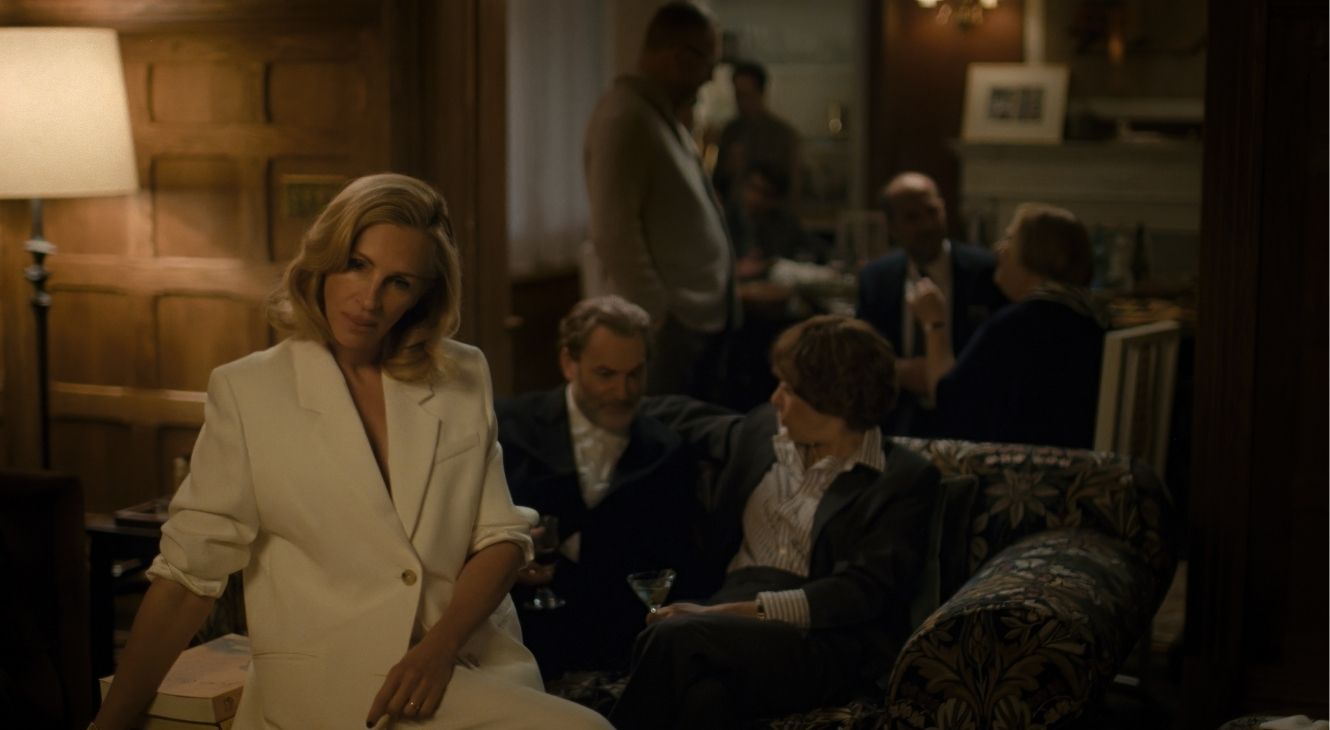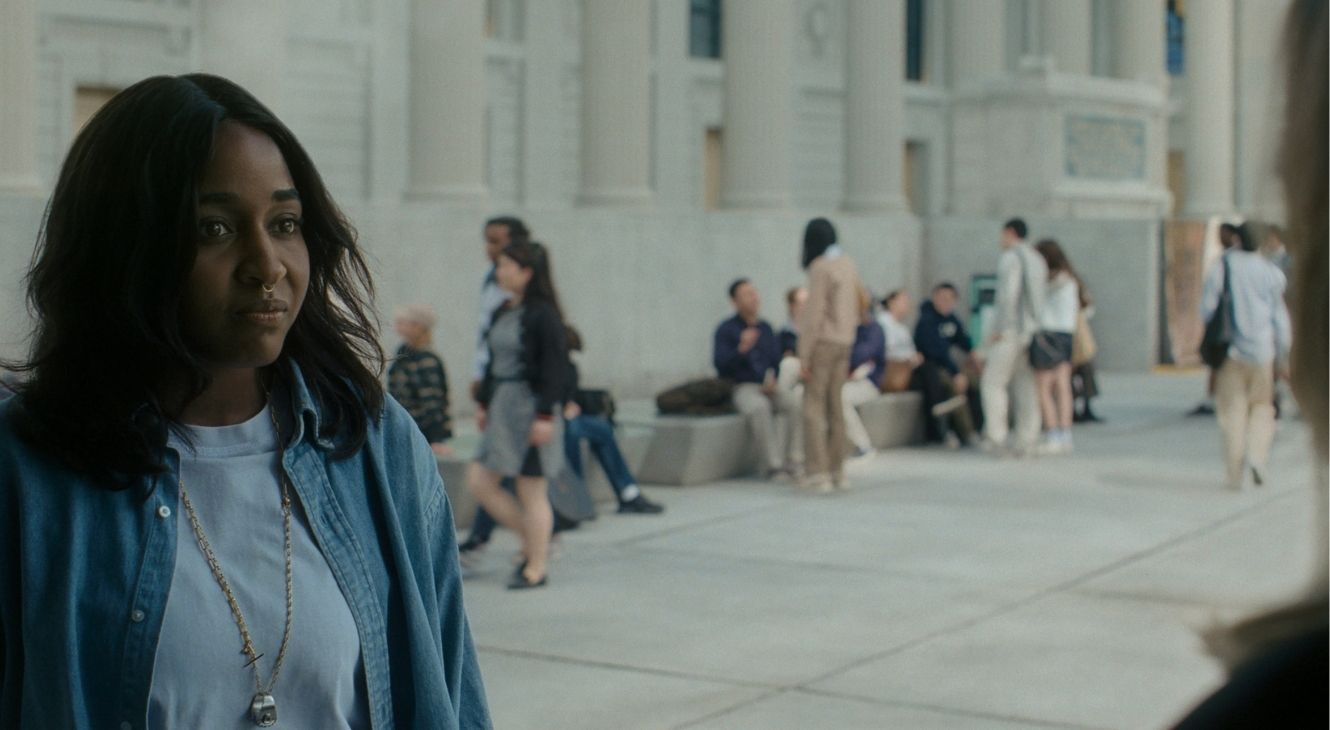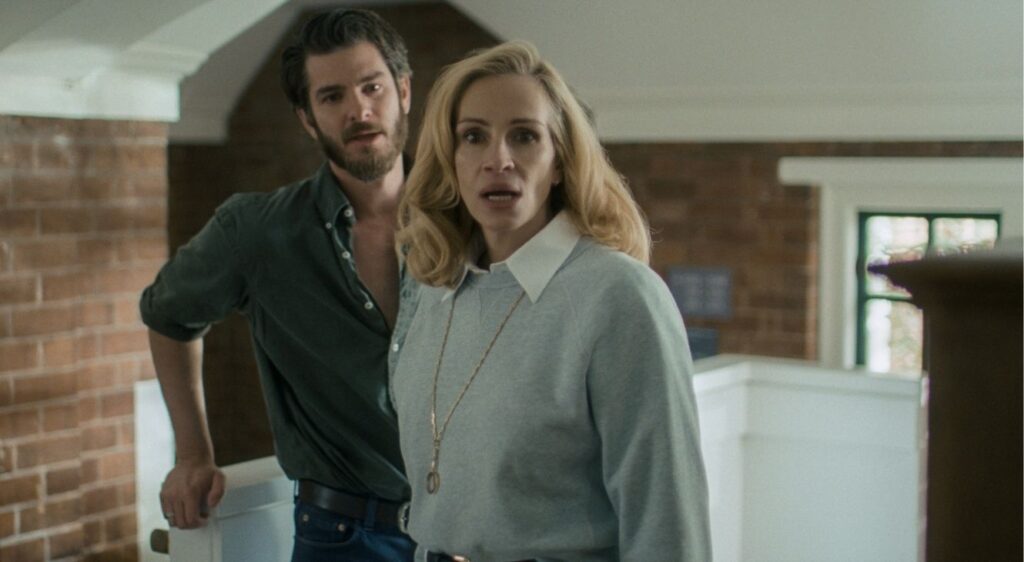After The Hunt aims to provoke discussion and, in some parts, succeeds, but not for the right reasons. Tackling a variety of titillating topics surrounding generational differences, inclusivity, #MeToo, among other things, the latest directorial venture from Luca Guadagnino, which was penned by Nora Garrett in her screenwriting debut, After The Hunt fails to skim beyond the surface of its topical juggling act. Instead, we’re left wandering around in circles along with this cast of characters until the truth comes too little too late.
Opening up on the constantly ticking clock of Professor Alma Imhoff’s (Julia Roberts) life, we’re transported to a party hosted in Imhoff’s own home, where we meet our core group of characters engaging in a round of intellectual debate. Through body language, light touches, and cursory glances, much is told about the characters’ relationships before After The Hunt introduces its initiating conflict.
Each character is wrapped up in their own form of self-involvement, paving the way for what should be a fascinating character dissection across the board. And, for the first half of the film, the potential is there. When Alma’s star pupil, Maggie (Ayo Edebiri), comes to her with an earth-shattering accusation against her friend and colleague, Hank Gibson (Andrew Garfield), Alma is placed in a moral and ethical dilemma that rocks her world.
Alma finds herself at the center of a rapidly growing dilemma, but too many topics drag her down.

In a familiar case of he said/she said, Garrett’s screenplay casts a dubious net over both parties, allowing the audience’s perception to sway judgment before the story attempts to dig deeper. As the central focus, Roberts’ Alma is a woman of ambition from a different generation, having clawed her way up through the male-dominated academic world. Maggie sees a mirror, and as After The Hunt ventures forward, it serves as a mirror for better and worse.
This alone should make for an intriguing storytelling playground, yet Garrett’s screenplay gets lost in its attempt to explore a variety of topics. Most puzzling is its castigation and generalization of younger generations, with many of the college faculty and professors echoing sentiments straight out of an online forum or post. The conversations surrounding privilege, sensitive youth, and identity, when had, don’t read authentically, despite the cast’s best attempts.
Sure, the handling of the dialogue highlights the hypocrisy of the academic setting, especially at an elite college like Yale, but none of these conversation points occur organically and often feel shoehorned in. Even more so, the topics tackled take on a more circular journey in the screenplay, inevitably rendering subjects redundant with little else to say. A tighter script could have done wonders by reducing these moments and allowing for a stronger storyline.
After The Hunt needed additional drafts to achieve something great.

It is a wonder then that part of what makes After The Hunt at least somewhat redeemable is its performances. Roberts’ Alma is cold, with her WASP-like appearance heavily cultivating an air of tightly controlled regality and authority. Yet, as control starts to slip from her grasp, so too does her appearance, with her too-blonde hair rendering her skin a sickly pallor, and her clothes slipping into dishevelment.
Edeberi plays Maggie with an underlying current of anxiety, never quite sure or confident until forced into a corner. This anxiety sells everything the role requires, leaving viewers (and Alma) guessing about plausible motivations in every direction. Central to Maggie’s horror is Garfield’s Hank, who oozes charisma and flirtation, easily painting him as one capable of such treachery. And, in his scenes with Julia Roberts, the camaraderie and playfulness between their two characters is electric.
Despite the performances, though, these characters are genuinely representative of the worst kind of academic people, making an easy argument for audience alienation. I’m a fan of unlikable characters, but even the most likable one, Frederik (Michael Stuhlbarg), proves to be grating at moments. After The Hunt fails to fully address the question of, “Why should we care about these people?” Because, frankly, they are all rather abysmal and opportunistic, including Maggie, without the layer of likability to spark interest.
After The Hunt had the potential to be something great. It has an outline for the kind of story that would spark awards conversations. However, with its checklist of hot-button topics never finding a footing and a group of characters that are truly hard to root for, After The Hunt inevitably becomes a frustrating lesson in patience until its baffling final cry of ‘Cut!’
After The Hunt will stream exclusively on Prime Video on November 20, 2025.
After The Hunt
-
Rating - 4/104/10
TL;DR
With its checklist of hot-button topics never finding a footing and a group of characters that are truly hard to root for, After The Hunt inevitably becomes a frustrating lesson in patience until its baffling final cry of ‘Cut!’







